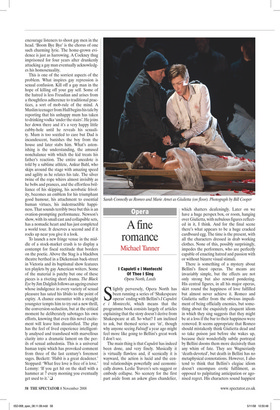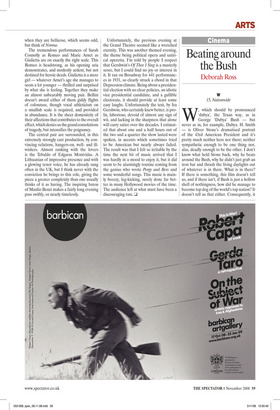A fine romance
Michael Tanner
I Capuleti e i Montecchi Of Thee I sing Opera North, Leeds
Slightly perversely, Opera North has been running a series of ‘Shakespeare operas’ ending with Bellini’s I Capuleti e i Montecchi, which means that the programme book consists largely of articles explaining that the story doesn’t derive from Shakespeare at all. So what? I am inclined to ask, but themed series are ‘in’, though why anyone seeing Falstaff a year ago might feel more like going to Bellini’s great work I don’t see.
The main thing is that Capuleti has indeed been done, and very finely. Musically it is virtually flawless and, if scenically it is wayward, the action is lucid and the central relationships powerfully and economically drawn. Leslie Travers’s sets suggest or embody collapse. No scenery for the first part aside from an askew glass chandelier, which shatters deafeningly. Later on we have a huge perspex box, or room, hanging over Giulietta, with nebulous figures reflected in it, I think. And for the final scene there’s what appears to be a huge cracked cardboard egg. The time is the present, with all the characters dressed in drab working clothes. None of this, possibly surprisingly, impedes the performers, who are perfectly capable of enacting hatred and passion with or without bizarre visual stimuli.
There is something of a mystery about Bellini’s finest operas. The means are invariably simple, but the effects are not only strong but also reward pondering. His central figures, in all his major operas, skirt round the happiness of love fulfilled but almost never achieve it. Romeo and Giulietta suffer from the obvious impediment of being officially enemies, but something about the exquisitely eloquent idiom in which they sing suggests that they might be at a loss if the bar to their happiness were removed. It seems appropriate that Romeo should mistakenly think Giulietta dead and so take poison just before she wakes up, because their wonderfully subtle portrayal by Bellini dooms them more decisively than any whim of fate. They are Wagnerianly ‘death-devoted’, but death in Bellini has no metaphysical connotations. However, I also tend to think that Bellini’s elegiac idiom doesn’t encompass erotic fulfilment, as opposed to palpitating anticipation or agonised regret. His characters sound happiest when they are bellicose, which seems odd, but think of Norma.
The tremendous performances of Sarah Connolly as Romeo and Marie Arnet as Giulietta are on exactly the right scale. This Romeo is headstrong, as his opening aria demonstrates, and modestly ardent, but not destined for heroic deeds. Giulietta is a mere girl — whatever Arnet’s age she manages to seem a lot younger — thrilled and surprised by what she is feeling. Together they make an almost unbearably moving pair. Bellini doesn’t award either of them giddy flights of coloratura, though vocal athleticism on a smallish scale is required, and provided in abundance. It is the sheer domesticity of their affections that contributes to the overall effect, which denies us the grand consolations of tragedy, but intensifies the poignancy.
The central pair are surrounded, in this extremely strongly cast production, by convincing relations, hangers-on, welland illwishers. Almost ranking with the lovers is the Tebaldo of Edgaras Montvidas. A Lithuanian of impressive presence and with a glowing tenor voice, he has already sung often in the UK, but I think never with the conviction he brings to this role, giving the piece a greater complexity than one usually thinks of it as having. The inspiring baton of Manlio Benzi makes a fairly long evening pass swiftly, or nearly timelessly. Unfortunately, the previous evening at the Grand Theatre seemed like a wretched eternity. This was another themed evening, the theme being political opera and satirical operetta. I’m told by people I respect that Gershwin’s Of Thee I Sing is a masterly score, but I could find no joy or interest in it. It ran on Broadway for 441 performances in 1931, so clearly struck a chord in that Depression climate. Being about a presidential election with no clear policies, an idiotic vice presidential candidate, and a gullible electorate, it should provide at least some easy laughs. Unfortunately the text, by Ira Gershwin, who certainly knew better, is prolix, laborious, devoid of almost any sign of wit, and lacking in the sharpness that alone will carry satire over the decades. I estimated that about one and a half hours out of the two and a quarter the show lasted were spoken, in accents which sometimes tried to be American but nearly always failed. The result was that I felt so irritable by the time the next bit of music arrived that I was hardly in a mood to enjoy it, but it did seem to be alarmingly routine coming from the genius who wrote Porgy and Bess and some wonderful songs. This music is mainly breezy, leg-kicking, surely done far better in many Hollywood movies of the time. The audience left at what must have been a discouraging rate. ❑



















































































 Previous page
Previous page